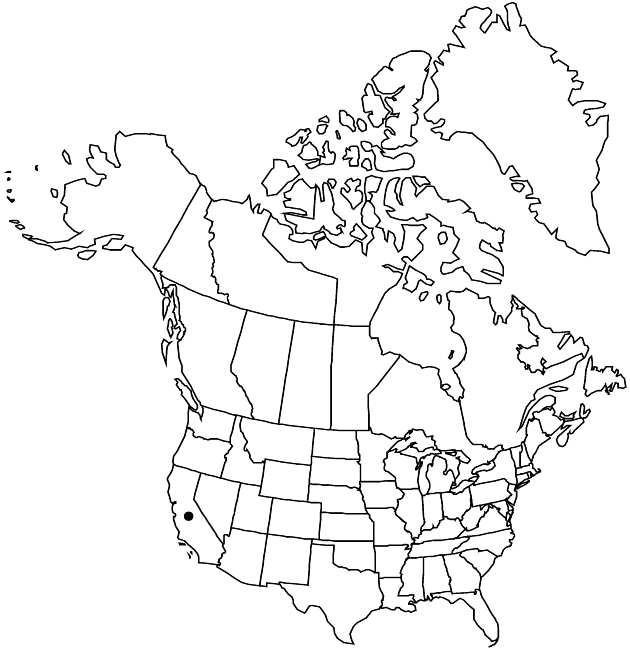Difference between revisions of "Heterotheca oregona var. scaberrima"
Brittonia 39: 383. 1987.
FNA>Volume Importer |
imported>Volume Importer |
||
| (6 intermediate revisions by 2 users not shown) | |||
| Line 7: | Line 7: | ||
|year=1987 | |year=1987 | ||
}} | }} | ||
| − | |basionyms={{Treatment/ID/ | + | |special_status={{Treatment/ID/Special_status |
| + | |code=E | ||
| + | |label=Endemic | ||
| + | }} | ||
| + | |basionyms={{Treatment/ID/Basionym | ||
|name=Chrysopsis oregona var. scaberrima | |name=Chrysopsis oregona var. scaberrima | ||
|authority=A. Gray | |authority=A. Gray | ||
| + | |rank=variety | ||
| + | |publication_title=in A. Gray et al., Syn. Fl. N. Amer. | ||
| + | |publication_place=1(2): 124. 1884 | ||
}} | }} | ||
|synonyms= | |synonyms= | ||
| Line 26: | Line 33: | ||
|elevation=100–700 m | |elevation=100–700 m | ||
|distribution=Calif. | |distribution=Calif. | ||
| − | |discussion=<p>Variety scaberrima is found in the inner Coast Ranges. Its branches tend to be longer on average; the arrays are thus rather large and open compared to undamaged plants of the other varieties. The smaller leaves of much branched and few-headed specimens of var. rudis can result in a habit similar to that of var. scaberrima. This could create confusion in identity if the ovate outer phyllaries of the latter are overlooked.</p> | + | |discussion=<p>Variety scaberrima is found in the inner Coast Ranges. Its branches tend to be longer on average; the arrays are thus rather large and open compared to undamaged plants of the other varieties. The smaller leaves of much branched and few-headed specimens of <i></i>var.<i> rudis</i> can result in a habit similar to that of <i></i>var.<i> scaberrima</i>. This could create confusion in identity if the ovate outer phyllaries of the latter are overlooked.</p> |
|tables= | |tables= | ||
|references= | |references= | ||
| Line 35: | Line 42: | ||
-->{{#Taxon: | -->{{#Taxon: | ||
name=Heterotheca oregona var. scaberrima | name=Heterotheca oregona var. scaberrima | ||
| − | |||
|authority=(A. Gray) Semple | |authority=(A. Gray) Semple | ||
|rank=variety | |rank=variety | ||
| Line 49: | Line 55: | ||
|publication title=Brittonia | |publication title=Brittonia | ||
|publication year=1987 | |publication year=1987 | ||
| − | |special status= | + | |special status=Endemic |
| − | |source xml=https:// | + | |source xml=https://bitbucket.org/aafc-mbb/fna-data-curation/src/2e0870ddd59836b60bcf96646a41e87ea5a5943a/coarse_grained_fna_xml/V19-20-21/V20_522.xml |
|tribe=Asteraceae tribe Astereae | |tribe=Asteraceae tribe Astereae | ||
|genus=Heterotheca | |genus=Heterotheca | ||
Latest revision as of 20:03, 5 November 2020
Stems usually branched distally, densely, coarsely stipitate-glandular. Leaves green to dark green, mid cauline averaging 13.9 × 3.9 mm (9.2–19.4 × 2.2–7.8 mm); branch leaves glabrate to sparsely hispid (fewer than 5 hairs/mm²), moderately to densely coarsely glandular. Outer phyllaries narrowly to broadly ovate. 2n = 18.
Phenology: Flowering Jul–Oct.
Habitat: Sand and gravel soils, gravel bars, along arroyos, flood plains of streams in dry oak woods and grassy hills
Elevation: 100–700 m
Discussion
Variety scaberrima is found in the inner Coast Ranges. Its branches tend to be longer on average; the arrays are thus rather large and open compared to undamaged plants of the other varieties. The smaller leaves of much branched and few-headed specimens of var. rudis can result in a habit similar to that of var. scaberrima. This could create confusion in identity if the ovate outer phyllaries of the latter are overlooked.
Selected References
None.
